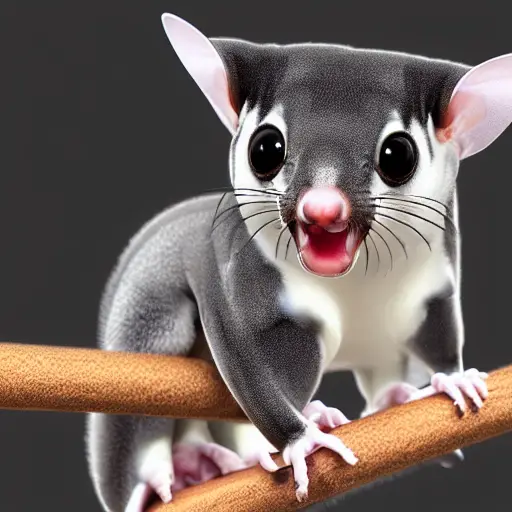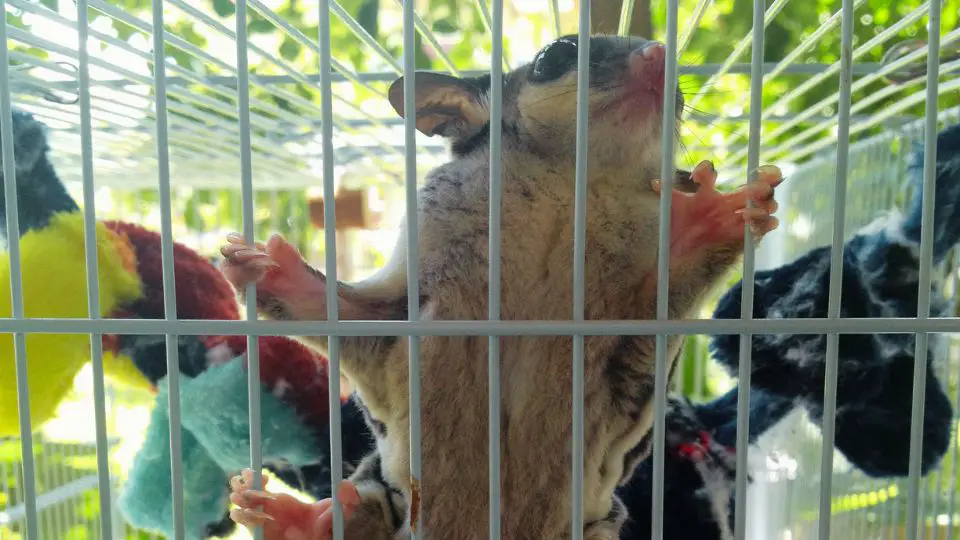The quick answer to this question is yes, sugar gliders can be aggressive. However, there are a few things that you should know about sugar gliders and their aggression.
First, sugar gliders are known to be very territorial animals. This means that they will often become aggressive if they feel like their territory is being threatened. Second, sugar gliders are also known to be very social animals. This means that they will often become aggressive if they feel like they are not getting enough attention from their owners. Lastly, sugar gliders are also known to be very sensitive animals, so they will often become aggressive if they feel like they are being ignored or mistreated.
Continue reading to see how to keep your sugar glider from becoming aggressive.
Are sugar gliders aggressive?
Sugar gliders can be aggressive, and they have been known to bite humans if they feel threatened or scared. However, sugar gliders typically only attack other animals if they feel like their territory is being invaded. With proper care and attention, sugar gliders can make great pets for people who are willing to put in the time and effort required to build a bond with these unique animals.
Sugar gliders are gentle creatures and have a reputation for being affectionate, so they’re far from aggressive. Some species of sugar gliders are known to bite humans, but most of the time this is a sign of affection. Anyway, this behaviour is not permanent, and sugar gliders will grow out of this phase.
The most common type of aggression is between males during mating season when it comes time for them to compete for territory. When two sugar gliders meet, they will size each other up and if one feels threatened, he may become aggressive.
Do sugar gliders bite a lot?
Yes, sugar gliders like to bite items and humans alike. This is mostly due to their playful nature, but it can also be a sign of affection. If you have been bitten by a sugar glider, it is important to wash the wound with soap and water as soon as possible.
Gliders can bite for several reasons, including fear, unfamiliar smells, and self defense. Biting can be helpful in such situations, as it can help sugar gliders protect themselves from potential danger.

Sugar gliders often use their biting behavior to protect themselves from being attacked, or to avoid confrontation with humans. However, once they’ve bonded with their humans, sugar gliders tend to bite less frequently.
If you’re worried that your sugar glider will bite you, keep treats nearby. Treats will help you distract your glider from soft bites and love nibbles. Some owners keep apple sauce or honey on a plate in their home. The sugar gliders will stop nibbling once they’ve consumed the treat. If you’re worried that they might hurt you, keep in mind that they’re prone to stress and can be easily frightened.
Do sugar gliders like to be held?
Sugar gliders are known for being very affectionate, and they typically love to be held. However, it is important to remember that every sugar glider is different and some may not enjoy being held as much as others.
If you are going to hold your sugar glider, it is important to do so in a way that is comfortable for both of you. Sugar gliders should never be held too tightly, as this can cause them to feel agitated and may lead to them biting.
What are sugar gliders afraid of?
There are a few things that sugar gliders are afraid of, such as:
- Loud noises
- Sudden movements
- Bright lights
If you want to keep your sugar glider calm, it is important to avoid making any sudden movements or loud noises. You should also avoid shining bright lights in their direction, as this can startle them.
Why Do Sugar Gliders Bite?
If you’ve ever wondered why sugar gliders bite, it’s probably because they are prey animals. They are easily frightened and will bite to protect themselves. Because sugar glider teeth are like tweezers, a bite feels like a firm pinch. However, this habit is normal and is not harmful to the gliders.
They’re scared
The most common reason why sugar gliders bite is because they’re scared. Sugar gliders are easily frightened, and will bite if they feel threatened. If you make any sudden movements or loud noises, you may startle them and cause them to bite.
They’re playful
Another common reason for sugar glider biting is because they’re simply being playful. Sugar gliders are very active and love to play, so they may bite you during playtime. If this happens, it’s important to not get too upset, as they probably didn’t mean to hurt you.
They’re trying to communicate
Sugar gliders may also bite to communicate their needs. If they’re feeling scared, agitated, or threatened, they may bite to let you know. It’s important to try to understand what your sugar glider is trying to tell you, so that you can avoid any potential bites in the future.
They’re showing affection
In some cases, sugar gliders may bite to show their affection. If they’re feeling particularly close to you, they may nibble on your fingers or toes. This behavior is usually harmless and is not indicative of aggression.
While sugar glider bites can be painful, it’s important to remember that they’re usually not trying to hurt you. If you think your sugar glider may be feeling threatened or scared, try to create a calm environment. This will help to reduce the chances of them biting.
They Don’t Recognize Your Scent
One reason sugar gliders may bite is because they don’t yet recognize your scent. Sugar gliders have a strong sense of smell, and they use this to identify their family and friends. If you’re new to the sugar glider world, they may not yet recognize your scent and may bite out of fear.
The best way to avoid this is to slowly introduce yourself to the sugar glider. Start by offering them a treat, and then gradually move on to petting them. Once they start to feel comfortable around you, they’ll be less likely to bite.
They’re stressed
Sugar gliders are very prone to stress, and this can often lead to biting. If the sugar glider is feeling overwhelmed, they may try to bite as a way to escape the situation. This is why it’s important to create a calm and relaxing environment for the sugar glider.
Sugar gliders can get stressed from:
- Too much noise
- Too many people
- Not enough space
- Lack of socialization
- Poor diet
- Pain
Show dominance
In some cases, sugar gliders may bite to show their dominance. This is most common with male sugar gliders, as they are typically more aggressive than females. If you have a male sugar glider, it’s important to be aware of their body language and look for signs that they may be about to bite.
Some common signs that a sugar glider is feeling dominant are:
- Standing up tall
- Stretching out their body
- Flicking their tail
- Thumping their feet
- Making loud noises
If you see any of these signs, it’s important to back off and give the sugar glider some space. Dominant sugar gliders are more likely to bite, so it’s best to avoid them if possible.
What to do if a sugar glider bites you
If you’re handling a sugar glider, it’s important to remember that it will bite you or nibble on you from time to time. Sugar gliders often do this to explore and test your boundaries. If you approach your glider in a non-threatening manner, however, you should reduce the amount of biting and risk of infection.
While sugar glider bites are painful, they’re not very serious. They don’t typically have sharp teeth and don’t require much force to penetrate skin. A bite from a sugar glider feels more like a firm pinch rather than a deep puncture. When it does bite, try to keep your finger still until the glider releases it. Once the glider has let go of your finger, slowly move the finger away.

After that, wash the wound with soap and water to remove any bacteria. Next, apply a cold compress to the area to reduce swelling. You may also want to see a doctor, particularly if the bite is deep or if you have any allergies to sugar gliders. With proper care, most sugar glider bites will heal quickly and without complications.
How To Stop Sugar Glider From Biting
The best way to stop a sugar glider from biting is to slowly introduce yourself and build trust. Sugar gliders are more likely to bite if they feel scared or threatened, so it’s important to make them feel comfortable around you.
Understand why sugar gliders bite
The first step to stopping a sugar glider from biting is to understand why they do it. As we’ve seen, there are several reasons why sugar gliders may bite, including fear, stress, and dominance. By understanding the reasons behind the biting, you can take steps to prevent it from happening.
Identify and avoid situations that may trigger biting
Once you know why sugar gliders bite, you can start to identify situations that may trigger it. If you know your sugar glider is afraid of loud noises, for example, try to avoid making any loud noises around them. If your sugar glider is prone to stress, try to create a calm and relaxing environment for them.
Use positive reinforcement to discourage biting
One of the best ways to stop a sugar glider from biting is to use positive reinforcement. This means rewarding the sugar glider when they don’t bite, and ignoring them when they do.
For example, if you’re handling your sugar glider and they don’t bite, give them a treat. If they do bite, however, simply put them down and walk away. With time, the sugar glider will learn that biting results in being ignored, while not biting results in being rewarded.
Be careful when you hold them
One mistake that many people make is holding their sugar glider too tight. Sugar gliders are small and delicate animals, so they need to be held gently. If you hold them too tight, they may feel trapped and respond by biting.
Instead of holding them tightly, cup your hand around their chest and let them crawl onto your finger. Once they’re on your finger, you can hold them close to your body so they feel secure.
Do Sugar Gliders Bite Other Animals?
Sugar gliders are not typically aggressive toward other animals, but they may bite if they feel threatened. If you have other pets in the house, it’s important to introduce them slowly and make sure the sugar glider has a place to retreat to if they feel scared.
In general, sugar gliders are shy and gentle animals, so they’re unlikely to start a fight with another animal. However, if another animal provokes them, they may respond with a bite.
They will often bite other animals if they feel threatened or if they are trying to assert dominance. Sugar gliders are known to be territorial animals and will often attack other animals that enter their territory. If you have a pet sugar glider, it is important to be aware of its potential for aggression and take steps to prevent it from harming other animals.
Conclusion
In conclusion, sugar gliders can be aggressive if they feel threatened or if they don’t have enough space. However, there are several ways to stop a sugar glider from biting, including slowly introducing yourself and using positive reinforcement. If you have a pet sugar glider, it’s important to be aware of its potential for aggression and take steps to prevent it from harming other animals.







